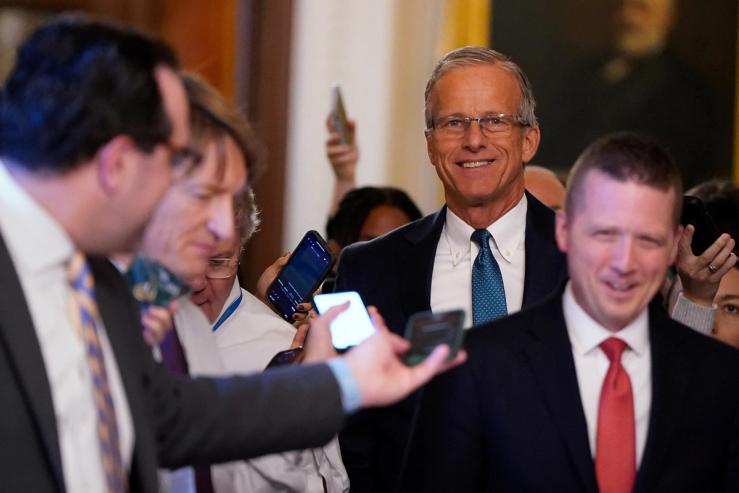The News
Senate Republican leaders are imposing maximum pressure — a looming recess and a demanding President Donald Trump — to move their massive tax-cuts bill through Congress this weekend, though it’s not clear they have the votes yet.
Behind the scenes, Republicans believe they are close to delivering a new version of the proposal that’s intended to ease the sting of its Medicaid cuts, according to people familiar with the plan. The biggest two changes that are incoming: delays in new restrictions to Medicaid’s provider tax funding and billions of dollars more for rural hospitals threatened by the funding changes.
GOP leaders also are closing in on an agreement with the House on state and local tax deductions — though it isn’t final.
The Senate could start voting as soon as Saturday, provided Republicans receive the final text of the legislation with enough time to review it. That would set up a crucial procedural vote on Saturday and final passage as soon as Sunday.
That’s all if Senate Majority Leader John Thune, R-S.D., has 50 votes to move forward. He’s not guaranteeing victory yet: “We’ll find out tomorrow.”
He certainly doesn’t have 50 public supporters right now, but Thune’s plans for weekend work and Trump’s arbitrary July 4 deadline are aimed at forcing recalcitrant Republicans to flip to yes over the next 24 hours. Sen. Rand Paul, R-Ky., dislikes the legislation and seems to be unswayable. Leaders can only lose two more votes and still pass the bill.
Sens. Thom Tillis, R-N.C., and Ron Johnson, R-Wis., are threatening to vote against moving forward — albeit for different reasons. And moderate Sens. Susan Collins, R-Maine, and Lisa Murkowski, R-Alaska, are unsure of how they will vote.
As Senate Minority Leader Chuck Schumer, D-N.Y., put it: “It’s obvious large chunks of their conference don’t like the bill.”
“Everyone keeps asking: ‘How are you going to vote on it?’” Murkowski told Semafor. “I want to see what it is.”
Senators briefly had a little breathing room on Friday after Trump said it would be OK if it took them a little bit longer than July 4 to finish the bill. Then he heaped back on the pressure minutes later, asking that the House send him the bill before July 4.
To make that happen, the House will likely have to agree to whatever bill the Senate can pass to avoid a protracted back and forth that would only annoy the president. After an urgent lunch with GOP senators, Speaker Mike Johnson, Treasury Secretary Scott Bessent and White House legislative staff, Bessent said that “we are very, very hopeful that there will be enough agreement between the two that the House can move quickly.”
Another wild card: Schumer and his fellow Democrats are considering a move to ask the Senate clerk to read the entire bill on the Senate floor, which would add hours to the floor debate.
Ron Johnson made a similar request in 2021 during debate on Democrats’ coronavirus relief bill; he subsequently bought the clerks a case of wine for their service.
In this article:
Know More
Several factors will determine Republicans’ success. The first is technical: They need the parliamentarian to approve their entire bill as eligible for protections from a filibuster.
That’s grown more complicated over the course of the week, as the nonpartisan parliamentarian knocks out several key provisions and requires Republicans to rework huge pieces of the bill.
The provider tax changes were among the provisions tossed out, although Republicans said it’s been reworked in a way they believe can pass muster. It’s one of the last pieces that Republicans need to finalize.
“I think they’re expecting [the parliamentarian] to bless it,” said Sen. John Kennedy, R-La. “There’s going to be a slight delay in implementation of the changes, but as I understand it, the bones of the proposal are still the same.”
That leads to another factor: Does Thune have 50 votes? Tillis has said without more substantial softening to the Medicaid cuts in the bill, he can’t support it, for example.
Final negotiations are likely to continue to the end of the “vote-a-rama,” an unlimited series of amendments that comes at the end of debate, said Sen. Markwayne Mullin, R-Okla.
And during that vote-a-rama, the bill could change significantly. The parliamentarian approved the Senate’s effort to stop states from regulating AI, but it could get stripped out on the floor with all 47 Democrats and just four Republican defections.
There’s also intense lobbying coming from the states. In a letter to the Pennsylvania delegation shared with Semafor, Democratic Gov. Josh Shapiro warned that more than $3 billion of energy projects could be threatened by the House’s version of the bill.
He asked the bipartisan delegation to “expand — not harm — Pennsylvania’s energy industry.”
Room for Disagreement
Ron Johnson said it would be a mistake for Republicans to force a vote on Saturday.
“I hope they don’t do that. We’re not ready for that,” he said.
Burgess’s view
There’s basically no reason for Thune not to continue pushing at this point. Senators are cranky, but they are still in Washington, and Trump isn’t giving them a lot of room to maneuver.
GOP leaders are fairly confident that, once the text of the bill comes out and the reality of having to vote is before them, they will get the 50 votes they need and ultimately pass the bill.
Every hour until then will be pressure-packed and challenging.
Notable
- The parliamentarian has signed off on a curtailed version of the tax bill’s moratorium on state AI regulations, per Axios.


